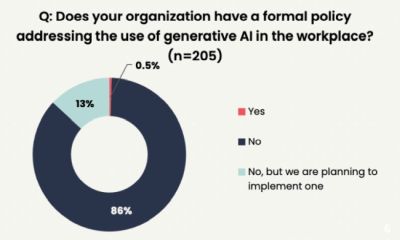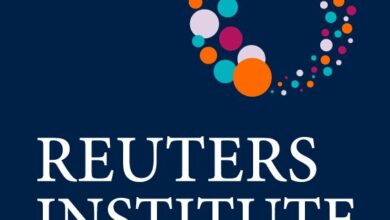Notice To Employers: Be Careful – Your Employees Might Be Using Generative AI In The Workplace – New Technology

Introduction
Artificial intelligence holds the promise of delivering new
waves of efficiency and productivity in the workplace, but it also
carries risk for employers who don’t mitigate operational,
reputational, and legal risks associated with unauthorized use.
Generative AI platforms such as ChatGPT, Google Gemini, and
Microsoft Copilot are free tools at the fingertips of employees.
Surveys conducted by KPMG and Salesforce have demonstrated that
generative AI is already widely used in Canadian workplaces, often
without employer knowledge.
Without a comprehensive policy governing the internal use of AI,
unauthorized use of AI by employees could jeopardize an
organization’s data security, intellectual property, and create
issues of liability and reputational damage.
Generative AI Use in the Workplace
KPMG recently carried out a Generative AI Adoption survey of over
4,500 Canadians which identified that one in five Canadians are
using generative AI daily with 61% percent of generative AI users
using the technology multiple times per week for work purposes.
Salesforce also recently carried out a survey collecting data from 14,000
global workers, including over 1,000 in Canada. The findings show
that 28% of professionals are using generative AI at work, while
55% of these professionals are using AI without approval from their
employers.
While the use of generative AI tools offers significant benefits
such as enhanced efficiency, creativity, and problem-solving
capabilities, it simultaneously introduces a plethora of challenges
and uncertainties, particularly when these tools are integrated
into the workplace.
Employer Concerns with Generative AI
Despite the growing buzz around generative AI, many
organizations remain on the fringes and are contemplating its
integration. In 2023, the Human Resources Professional Association
(HRPA) ran a pulse survey of its membership to
gain insights into their attitudes and behaviours regarding the use
of generative AI technology in the workplace. 205 respondents
across numerous industries participated in the survey.
While 67% of respondents indicated their organizations had no
plans to use generative AI technology, 47% of respondents were
either concerned or potentially concerned about employees using
generative AI in an unauthorized way to carry out their work
tasks.
Source: Generative AI in the
Workplace – HRPA Survey Report, 2023
While many organizations may not have plans to implement
generative AI, the results of the KPMG and Salesforce surveys
demonstrate that employees may have different ideas.
With the rapidly expanding landscape of artificial intelligence,
one term has increasingly gained attention: Democratized
Generative AI. This term represents a shift from AI being a
tool of the few to a resource of the many. This poses a particular
challenge for employers as free and easy access generative AI tools
means those without technical backgrounds and training have access
to a resource which presents significant risks if misused.
The HRPA reported that those respondents who did have concerns
about unauthorized use of generative AI in the workplace listed
privacy and security risks, lack of originality and plagiarism, and
poor output from the generative AI tools as common reasons.
Risks with Generative AI
Misuse of generative AI by employees can bring about
consequential legal, ethical, and operational risks. A few
illustrative examples include:
- Intellectual Property and Data Security:
Without explicit guidelines, employees might unwittingly compromise
sensitive information, leading to legal, financial, and
reputational damage. - Ethical and Legal Concerns: The absence of
ethical guidelines could result in the creation of content that
infringes on copyright laws or perpetuates bias, attracting legal
scrutiny and eroding public trust. - Operational Inefficiency: A lack of coherent
AI use policy may result in inconsistent and inefficient
operations, diminishing the potential benefits of generative AI
technologies.
Despite 47% of respondents expressing concerns about employees
using generative AI in the workplace, only 0.5% of respondents
reported that their organizations had a formal policy in place
addressing the use of generative AI in the workplace.

Source: Generative AI in the
Workplace – HRPA Survey Report, 2023
Regardless of whether an organization aims to use generative AI
in their operations, the vast number of tools currently available
are particularly appealing to employees, meaning that organizations
may have exposure to the risks presented by generative AI without
realizing it. This presents a critical blind spot in organizational
strategies.
Implementing Generative AI in the Workplace
Implementing a comprehensive Generative AI Workplace Policy not
only mitigates legal and operation risks but ensures ethical use,
protecting the organization’s intellectual property and data
security. It offers a framework for maximizing the benefits of
generative AI while maintaining control over its deployment and
usage.
The planned implementation of Canada’s Artificial
Intelligence Data Act (AIDA) underscores the urgency for employers
to recognize and address the use of generative AI in the workplace.
AIDA is anticipated to introduce a risk-based regulatory framework,
mandating that employers assess and mitigate risks associated with
high-impact AI systems – which could include generative AI
tools employed by staff. With requirements for transparency, data
anonymization, and robust accountability frameworks, AIDA will
likely significantly sharpen the legal and ethical responsibilities
surrounding AI. Notably, it is planned that the Act will carry
substantial penalties for non-compliance, emphasizing the legal and
financial imperatives of managing AI use.
The discrepancy between an employer’s perceived and actual
risk exposure is particularly relevant here; even if a business
does not officially deploy generative AI, it may still be liable
for its employees’ use of such technologies. Therefore,
developing comprehensive AI governance policies is not just prudent
– it is necessary to navigate the intricate landscape AIDA
will soon establish.
The content of this article is intended to provide a general
guide to the subject matter. Specialist advice should be sought
about your specific circumstances.



